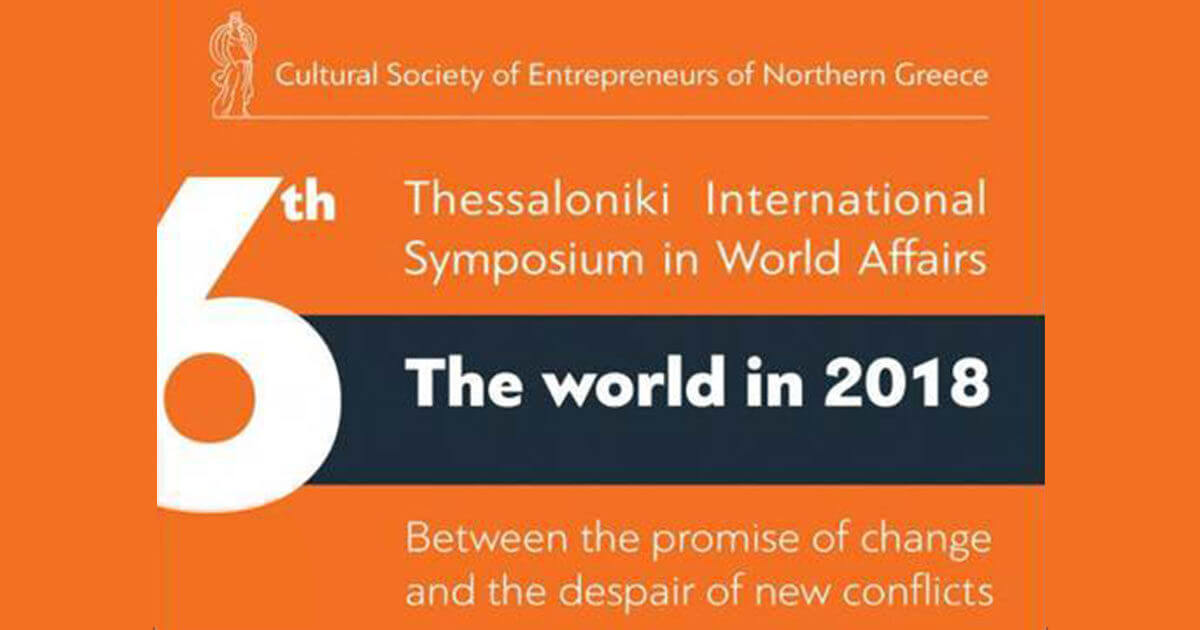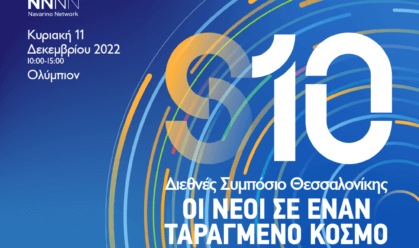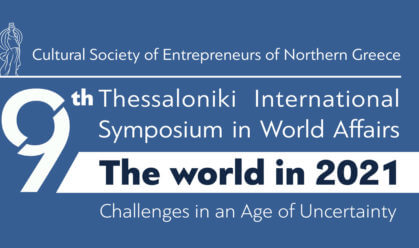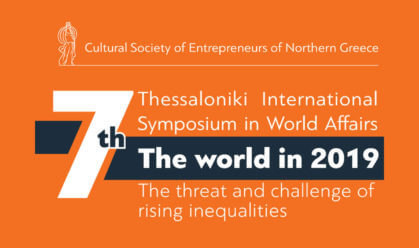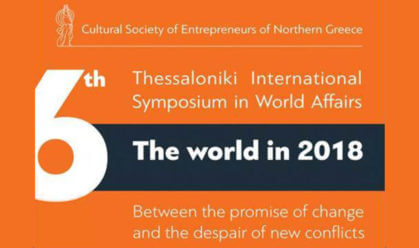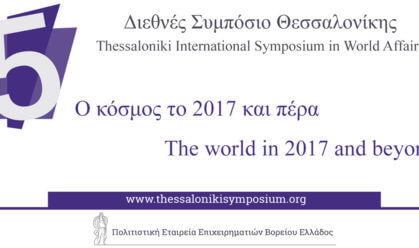| 10:00 | Registration |
| 10:30 | Welcoming remarks Dimitris Keridis, Director, Navarino Network Stavros Andreadis, Chairman, The Cultural Society of Entrepreneurs of Northern Greece Yiannis Boutaris, Mayor of Thessaloniki Norbert Beckmann-Dierkes, Acting Head of Greece Office, Konrad-Adenauer-Stiftung  |
| 10:45-11:45 | Cyprus and Greece: Beyond the crisis? |
| Life before, during and after the bail-out agreement: Lessons learned from Cyprus | |
 | Harris Georgiades, Minister of Finance of the Republic of Cyprus  Speaker’s short bio Harris Georgiades is the Minister of Finance of the Republic of Cyprus since April 2013 and participates in the Eurogroup and the ECOFIN. He was elected Chairman of the Board of Governors of the European Bank for Reconstruction and Development for the period 2014-2015 and is a member of the Board of Governors of the International Monetary Fund, the European Investment Bank and the European Stability Mechanism. He was selected by POLITICO as one of the 28 most-influential Europeans for 2016. He participates in the New Leaders for Europe community of the World Economic Forum. Prior to his appointment as Minister he was a Member of the House of Representatives with the Democratic Rally Party (2011-2013). He studied International Relations and Economics at the University of Reading, UK and was a post-graduate researcher at the Institute of European and International Studies, University of Reading. |
| Is Greece out of the woods? Prospects for a sustainable economic recovery | |
 | Joan Hoey, Regional director (Europe), The Economist Intelligence Unit  Speaker’s short bio Joan Hoey heads a large team of analysts covering Europe, in the Economist Intelligence Unit’s Country Analysis division, and is personally responsible for compiling political and economic forecasts for a number of countries in the region, including the UK and Greece. Joan is an expert on Greece, the Balkans and Eastern Europe; and has specialised in political risk; geopolitics; democracy; and post-communist transition. Joan is a frequent commentator for news services such as the BBC, Sky, CNN and CNBC. She has often been invited to share her perspectives on Europe with senior corporate executives, academics and diplomatic officials. Joan is the Editor of the EIU’s flagship annual Democracy Index. |
 | Moderator: Anthony Papayannides, Journalist & Attorney-at-Law Dimitris Keridis * Speaker’s short bio Anthony D. Papagiannides studied Law in Athens University and completed his post-graduate studies in Law, Economics and International Relations and in Medieval History in Strasbourg and Cambridge. From 1972 onwards he is a journalist, then a columnist at a number of Greek newspapers and presently the managing director of Economia Publishing. He also writes a blog at economia.gr and takes part at “Evening Report” of Action 24 Channel. . |
| 11:45-13:00 | The threat of Islamism |
| ISIS and global jihad | |
 | Alia Brahimi, Co-director, Legatus Strategic Intelligence and Advisory  Speaker’s short bio Alia Brahimi is a leading expert in terrorism and political trends in the Middle East and North Africa. She has held a number of academic positions, most recently as Visiting Fellow at the Oxford University Changing Character of War Programme. She was previously a Research Fellow at the London School of Economics (2009-2013) and a Research Associate in International Relations at the University of Oxford (2007-2009). Alia has advised decision-makers at the highest levels in governments and corporations. She recently served as an expert witness to the UK Parliament’s Defence Select Committee on emerging threats from the Middle East and North Africa. Alia is co-founder of the London-based strategic intelligence and advisory firm Legatus. She read for her Master’s and PhD in International Relations at the University of Oxford, where she also completed her post-doctoral research. |
 | Emma Sky, (video message) Senior Fellow, Jackson Institute for Global Affairs & Director, Maurice R. Greenberg World Fellows Program, Yale University  Speaker’s short bio Emma Sky is director of Yale’s Maurice R. Greenberg World Fellows Program and a Senior Fellow at the Jackson Institute, where she teaches Middle East politics. She is the author of The Unraveling: High Hopes and Missed Opportunities in Iraq. Sky served as advisor to the Commanding General of US Forces in Iraq from 2007-2010; as advisor to the Commander of NATO’s International Security Assistance Force in Afghanistan in 2006; as advisor to the US Security Co-ordinator for the Middle East Peace Process in 2005; and as Governorate Co-ordinator of Kirkuk for the Coalition Provisional Authority, 2003-2004. Prior to that, Sky worked in the Palestinian territories for a decade, managing projects to develop Palestinian institutions; and to promote co-existence between Israelis and Palestinians. In addition, Emma has provided technical assistance on poverty elimination, human rights, justice public administration reform, security sector reform, and conflict resolution in the Middle East, South Asia and Africa. Sky has published numerous articles including in The New York Times, Foreign Affairs, Foreign Policy, Politico, Atlantic, Slate, Survival, Center for a New American Security, US Institute of Peace, the Guardian, and the Journal of the Royal United Services Institute for Defence and Security Studies. Sky was educated at Oxford (UK), Alexandria (Egypt), Hebrew University of Jerusalem (Israel) and Liverpool (UK). Sky is an Officer of the British Empire. |
| The West and the rest: From anti-Semitism to Islamophobia | |
 | James Renton, Reader in History, Edge Hill University & Visiting Fellow, European University Institute  Speaker’s short bio James Rentonis Reader in History at Edge Hill University, and Visiting Fellow at the European University Institute, where he is Academic Consulting Editor at MONITOR: Global Intelligence on Racism. He is co-editor with Ben Gidley of Antisemitism and Islamophobia in Europe: A Shared Story? (Palgrave Macmillan, 2017). He teaches and writes on race, empire, and global politics.. |
 | Moderator: Ino Afentouli, Program Officer for Partnerships, Cooperative Security and Open Door policies, Regional Coordinator for South Caucasus & Central Asia, and Program Officer for Greece at the Public Diplomacy Division of the North Atlantic Treaty Organization Speaker’s short bio Despina-Ino Afentouli currently serves as Program Officer for Partnerships, Cooperative Security and Open Door policies, regional coordinator for South Caucasus & Central Asia, and Program Officer for Greece at NATO’s Public Diplomacy Division. Her main tasks include the elaboration and implementation of the organization’s communication strategy towards the areas under her responsibility. Before joining NATO, from 1986 to 2001, D.I. Afentouli had extensive experience as a foreign policy and European affairs journalist and columnist. Her experience included serving as European Affairs Editor at the Athens News Agency (1997-2001), editor-in-chief of the Greek edition of the Economist Intelligence Unit reports (1996-1999), diplomatic correspondent for STAR Channel (1995-1996) and Messimvrini Daily, (1995-1996), political correspondent at Kathimerini Daily (1989-1994), and Foreign Affairs editor, Athens Municipal Radio (1986-1989). D.I Afentouli studied Law at Athens University (BA) and earned an MA degree in Political Communication at the University of Paris-I (Sorbonne). She was a member of the European Association of Journalists and served as Secretary General of the European Network of Women Journalists (1994-98). |
| 13:00-14:00 | Innovation and growth |
| Technology and innovation: The new frontier | |
 | Bhaskar Chakravorti, Senior Associate Dean of International Business and Finance & Executive Director, Institute for Business in the Global Context, The Fletcher School, Tufts University  Speaker’s short bio Bhaskar Chakravorti is the Senior Associate Dean of International Business & Finance at The Fletcher School at Tufts University and Executive Director of Fletcher’s Institute for Business in the Global Context (IBGC). Having joined Fletcher in 2011, Bhaskar also serves as a Professor of Practice in International Business. Prior to Fletcher, Bhaskar was a Partner of McKinsey & Company and a leader of McKinsey’s Innovation and Global Forces practices, on the faculty of Harvard Business School and a Distinguished Scholar at MIT’s Legatum Center. Bhaskar earned a PhD in Economics from the University of Rochester. He is a graduate of the Delhi School of Economics and Delhi’s St. Stephen’s College. |
| Can Greece cover the digital gap? | |
 | Andreas Drimiotis, Business Consultant & Columnist, «Kathimerini»  Speaker’s short bio Andreas Drimiotis studied Civil Engineering at the National Technical University of Athens. In 1984, along with Alpha Bank and Doxiadis Associates, he established Delta Informatics S.A., the first IT outsourcing company in Greece. He was its Managing Director and Chairman of the Board until 2004, when the company was acquired by the American company First Data Corporation. In 2005-06 he was the Vice President of Unisystems and in 2007-09 he was the Chairman of SingularLogic. In 2010-11 he was the Head of the Information and Telecommunications Unit at the Prime Minister’s Office. He is one of the pioneers of Information Technology in Greece. His most important achievement is the design and implementation of the IT system for the Greek Elections for the period 1981–2009. Since 2012 he holds a weekly column in Sunday newspaper “Kathimerini”. |
 | Moderator: Stamos Karamouzis, Provost and Vice President for Academic Affairs, American College of Thessaloniki Speaker’s short bio Professor Stamos Karamouzis is the provost and vice president for academic affairs at the American College of Thessaloniki (ACT) in Greece. Prior to joining ACT he served as the dean of the School of Computer & Information Sciences at Regis University in Denver, Colorado. Before that he occupied the Anita & Truman Arnold Endowed Chair in Computer & Information Sciences (CIS) and headed the CIS Department at Texas A&M University – Texarkana. Overall, he has more than 30 years in the education field that includes faculty and administrative appointments at Hampton University, College of William & Mary, Tulane University, University of Macedonia in Greece, Loyola University New Orleans, and Texas A&M University – Texarkana. Prior to making a career in academia he conducted basic and applied research at NASA’s Langley Research Center where he also served as a Resident Research Associate of the National Research Council. Dr. Karamouzis is published in the areas of artificial intelligence, educational technologies, and the impact of technological innovation on society. He holds a doctorate in Computer Science from the College of William & Mary and he is a graduate of the Institute for Management and Leadership in Education at Harvard University. |
| 14:00-15:00 | Lunch break |
| 15:00-16:30 | New security challenges |
| Meeting the challenge: The North Atlantic Treaty Organization in the 21st century | |
 | Jamie Shea, Deputy Assistant Secretary General for Emerging Security Challenges, North Atlantic Treaty Organization  Speaker’s short bio Jamie Shea is NATO Deputy Assistant Secretary General for Emerging Security Challenges. He has been working with NATO since 1980, on numerous high-ranking positions such as Director of Policy Planning in the Private Office of the Secretary General. He has held various academic positions at universities around the world, including that of Professor at the Collège d’Europe, Bruges and Associate Professor of International Relations at the American University, Washington DC. Amongst his many associations and memberships, Jamie Shea is a member of the Policy Council at the World Economic Forum in Geneva and founder and member of the Board, Security and Defense Agenda Brussels and Friends of Europe. Jamie Shea is a recipient of the Golden Eagle medal of the Republic of Albania and the Linden medal of the Czech Republic. He holds a D.Phil. in Modern History from Oxford University (Lincoln College), 1981. |
| The Euro-Russia connection: How much of a threat is Russia? | |
 | Laza Kekic, Independent Consultant  Speaker’s short bio Laza Kekic is an independent consultant specialising in political development, the Balkans, Russia, economic analysis, forecasting and growth economics. Until 2015 he was Regional Director for Europe at the Economist Intelligence Unit (EIU), London, which he originally joined in 1993. Laza also headed the EIU’s Country Forecasting Services, which include the EIU’s main traditional product, the Country Reports, as well as the Country Forecasts (medium and long-term forecasts for 82 countries aimed at direct investors). Laza created the EIU’s business environment rankings, its long-term growth model, the democracy index and quality of life index. He has written extensively for the Economist Intelligence Unit and other outlets. |
 | Kristin Fabbe, (video message) Assistant Professor, Harvard Business School Speaker’s short bio Kristin Fabbe is an assistant professor in the Business, Government, and International Economy Unit. Her primary expertise is in comparative politics, with a regional focus on the Middle East and southeastern Europe, particularly Turkey. Kristin is co-chair for the study group on Colonial Encounters and Divergent Development Trajectories in the Mediterranean at Center for European Studies at Harvard and a faculty affiliate at the Middle East Initiative at the John F. Kennedy School of Government’s Belfer Center. In her research, Professor Fabbe seeks to understand the relationship between state-driven development strategies and identity politics. She has analyzed the role of religious elites, institutions, and attachments in state centralization initiatives in Greece, Turkey, and Egypt, and examined how laws, norms, and access to capital shape the experiences of female business owners in Northern Iraq and the wider Middle East. Her opinion pieces on regional issues have been published in The Washington Post, the Los Angeles Times, and The Christian Science Monitor. Professor Fabbe received her PhD in political science from the Massachusetts Institute of Technology. She also holds an MSc in international relations from the London School of Economics and a BA in history from Lewis and Clark College. Before joining HBS, she was an assistant professor of government at Claremont McKenna College. |
| What about Turkey? | |
 | Wolfango Piccoli, Co-President, Teneo Intelligence  Speaker’s short bio Wolfango Piccoli is Co-President of Teneo Intelligence. Based in London, he serves as Director of Research and also covers political risk in Europe, with a special focus on Italy, Greece and Turkey. Prior to joining Teneo, Piccoli was the director of the London office and head of the Europe practice at Eurasia Group, where he was responsible for advising financial, corporate and government clients on political developments in Europe. Piccoli is a frequent commentator on European politics in major media outlets, including the International Herald Tribune, the Financial Times, CNN International, CNBC, BBC, Bloomberg, CNBC Europe and Al-Jazeera English. |
 | Federica Mogherini, (video message) High Representative of the Union for Foreign Affairs and Security Policy / Vice-President of the Commission  Speaker’s short bio Federica Mogherini is an Italian politician and the current High Representative of the European Union for Foreign Affairs and Security Policy and Vice-President of the European Commission in the Juncker Commission since 1 November 2014. Mogherini was Italy’s Minister for Foreign Affairs and International Cooperation from 22 February 2014 until 31 October 2014 in the centre-left Cabinet of Matteo Renzi. She is a member of the Italian Democratic Party and the Party of European Socialists. |
 | Moderator: Joan Hoey, Regional director (Europe), The Economist Intelligence Unit Speaker’s short bio Joan Hoey heads a large team of analysts covering Europe, in the Economist Intelligence Unit’s Country Analysis division, and is personally responsible for compiling political and economic forecasts for a number of countries in the region, including the UK and Greece. Joan is an expert on Greece, the Balkans and Eastern Europe; and has specialised in political risk; geopolitics; democracy; and post-communist transition. Joan is a frequent commentator for news services such as the BBC, Sky, CNN and CNBC. She has often been invited to share her perspectives on Europe with senior corporate executives, academics and diplomatic officials. Joan is the Editor of the EIU’s flagship annual Democracy Index. |
| 16:30-17:00 | Coffee Break |
| 17:00-18:30 | Europe: Is the crisis over? |
| Brexit no Exit? | |
 | Denis MacShane, Former Labour Party MP & former Minister of State for Europe Denis MacShane: «Britain Becomes Greece as Brexit Chaos Invades Politics and the Economy» ** Denis MacShane: «Welcome to banana republic Britain»  Speaker’s short bio Dr Denis MacShane is a a former UK Minister of Europe, a Labour MP for 18 years, and a former UK delegate to the Council of Europe. He was a former BBC producer and President of the UK National Union of Journalists. Between 1979 and 1994 he was based in Geneva working on international trade union campaigns. He speaks French, German and Spanish. He has written several books on European politics including the first biography in English of the French president, François Mitterrand, the first book in English on the Polish trade union, Solidarity, as well as books on global anti-semitism and Western Balkan politics. He coined the term Brexit in 2012 and in January 2015 published Brexit: How Britain Will Leave Europe which warned that if a referendum was held on UK membership of the EU it would result in a negative vote. He takes no satisfaction from his role as a Cassandra on Brexit. His new book, Brexit, No Exit. How (in the End) Britain Won’t Leave Europe argues that a compromise will be found on the Brexit question. He writes for UK, European and US papers. |
| After the crises: The potential of a Europe à la carte | |
 | Heribert Dieter, Senior Associate, German Institute for International and Security Affairs & Adjunct Professor, Free University of Berlin  Speaker’s short bio Heribert Dieter is Senior Fellow at the German Institute for International and Security Affairs, Berlin, and a non-resident Senior Fellow at the Chongyang Institute for Financial Studies, Beijing. He is also an Associate Professor at Potsdam University and a Visiting Professor for International Political Economy at Zeppelin University. His research focuses on international trade and finance. He has worked on regional integration in Europe and the Asia-Pacific, particularly on supranational financial co-operation. He is currently analysing the prospects for globalization à la carte, which enables societies to express their preferences in the design of their countries’ economic policies. Dr Dieter studied Political Science and Economics at the Free University of Berlin and at the Australian National University in Canberra. He holds a doctorate in Economics and Political Science from the Free University of Berlin. |
| Stars and Laggards | |
 | Wolfango Piccoli, Co-President, Teneo Intelligence  Speaker’s short bio Wolfango Piccoli is Co-President of Teneo Intelligence. Based in London, he serves as Director of Research and also covers political risk in Europe, with a special focus on Italy, Greece and Turkey. Prior to joining Teneo, Piccoli was the director of the London office and head of the Europe practice at Eurasia Group, where he was responsible for advising financial, corporate and government clients on political developments in Europe. Piccoli is a frequent commentator on European politics in major media outlets, including the International Herald Tribune, the Financial Times, CNN International, CNBC, BBC, Bloomberg, CNBC Europe and Al-Jazeera English. |
| Regional shocks and the geography of discontent | |
 | Philip McCann, Professor & Chair in Urban and Regional Economics, Sheffield University Management School  Speaker’s short bio Philip McCann is Professor and Chair in Urban and Regional Economics at the Sheffield University Management School. He has previously help positions at the University of Reading, the University of Pennsylvania, the University of Cambridge, as well as Visiting Professorships at the University of Tsukuba, Japan, and Thammasat University, Thailand. Philip is Editor of Papers in Regional Science, Co-Editor of Spatial Economic Analysis, and Book Series Editor of Edward Elgar New Horizons in Regional Science. Professor McCann was educated at Cambridge University and his research interests are in Urban and Regional Economics, Economic Geography, Transport Economics, and International Business Economics. |
 | Moderator: Petros Golitsis, Lecturer in the Business Administration and Economics Department at City College, the International Faculty of the University of Sheffield Speaker’s short bio Petros Golitsis (1978), BSc, MSc and PhD researcher, is a Lecturer in the Business Administration and Economics Department at City College, the International Faculty of the University of Sheffield. His PhD thesis is on the “Interactions of monetary policies in SEEC in an EMU context. A Global-VAR model”. He delivers quantitative and monetary-financial modules both at undergraduate and postgraduate level at Thessaloniki and Sofia (in collaboration with VUZF). Prior to that, he has delivered modules in Tirana (in collaboration with the American University of Tirana), at the London School of Economics, UoL external program; at the University of Central Lancashire, external program; at the University of Highlands and Islands, external program. He has participated as a presenter and as a discussant on international conferences like the Applied Macro & Empirical Finance Conference (2016), International Association for Applied Econometrics (IAAE 2015), on the Annual South-East European Doctoral Student Conference (2015, 2016), etc. He has also attended seminars organized by the Association of South Eastern Europe Economic Universities (ASECU) on the ‘Recent Economic Developments and Problems in the Transition Economies’. |
Multimedia



